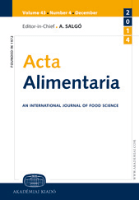
ACTA ALIMENTARIA
Scope & Guideline
Pioneering discoveries in agricultural and biological sciences.
Introduction
Aims and Scopes
- Food Safety and Microbiology:
Research on foodborne pathogens, antimicrobial properties, and the microbiological quality of food products, emphasizing the prevention of contamination and the development of safe food practices. - Food Chemistry and Biochemistry:
Studies involving the chemical composition and biochemical properties of food, including the effects of processing on food components and the nutritional implications of these changes. - Nutritional Science:
Exploration of the health impacts of various food components, dietary patterns, and functional foods, with a focus on their roles in disease prevention and health promotion. - Food Processing and Technology:
Innovative techniques and technologies for food processing, including the use of novel materials and methods to enhance food preservation, quality, and sensory attributes. - Sustainable Food Systems:
Research on the sustainability of food production and consumption, including studies on food waste reduction, the environmental impact of food systems, and the promotion of local food sources.
Trending and Emerging
- Functional Foods and Bioactive Compounds:
Increasing research on foods that offer health benefits beyond basic nutrition, including the study of bioactive compounds and their effects on health. - Nanotechnology in Food Science:
Emerging interest in the application of nanotechnology for food safety, preservation, and enhancement of functional properties, as seen with the use of nanoparticles in food systems. - Plant-based and Alternative Proteins:
A growing trend towards research on plant-based diets and alternative protein sources, driven by consumer demand for sustainable and health-conscious food options. - Food Waste Reduction Strategies:
Emerging studies focusing on innovative methods to minimize food waste, including valorization of by-products and sustainable practices in food production. - Health and Wellness Trends:
Research increasingly focuses on the impact of diet on chronic diseases, mental health, and overall wellness, aligning with global health initiatives and consumer interests.
Declining or Waning
- Traditional Food Preservation Techniques:
There has been a noticeable decrease in research focused on conventional methods of food preservation, such as salting and drying, as newer techniques gain popularity. - Basic Nutritional Studies:
Basic studies on macronutrient profiles and general dietary assessments are being overshadowed by more targeted research on functional foods and specific health outcomes. - Food Packaging Technologies:
Research on conventional food packaging technologies is less frequent, possibly due to a shift towards sustainable and biodegradable materials that are being prioritized in current studies.
Similar Journals

ITALIAN JOURNAL OF FOOD SCIENCE
Advancing the Frontiers of Food ScienceITALIAN JOURNAL OF FOOD SCIENCE is a distinguished open-access publication dedicated to advancing knowledge in the field of food science, catering to a global audience of researchers, professionals, and students. Published by Codon Publications in Singapore, this journal, operating under the ISSN 1120-1770 and E-ISSN 2239-5687, has been a vital platform for scholarly discourse since its inception in 1996, converging towards a comprehensive view of food science trends through 2024. With an impressive ranking in the third quartile (Q3) of the Food Science category and a Scopus rank of #151 out of 389, the journal plays a significant role in disseminating high-quality research, contributing to a richer understanding of food science within the agricultural and biological sciences. Since transitioning to open access in 2008, it has further expanded its reach, ensuring that innovative research is accessible to all, thereby fostering collaboration and knowledge exchange in this vital industry.
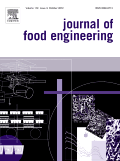
JOURNAL OF FOOD ENGINEERING
Elevating industry standards through rigorous scientific exploration.JOURNAL OF FOOD ENGINEERING, published by ELSEVIER SCI LTD, stands as a leading platform for innovative research within the realm of food science, focusing on the engineering principles applied to food production and processing. With an impressive impact factor reflective of its significance in the field, the journal boasts a Q1 ranking in Food Science and ranks #23 out of 389 in Agricultural and Biological Sciences according to Scopus metrics, placing it in the 94th percentile among its peers. Since its inception in 1982, the journal has aimed to disseminate high-quality, peer-reviewed research that informs and shapes industry practices and academic explorations. Although it does not currently offer an open access option, the journal is dedicated to fostering knowledge and innovation through rigorous editorial standards and a commitment to covering a broad range of topics related to food engineering. Researchers, professionals, and students alike will find the journal an invaluable resource for advancing their understanding of the scientific and technological facets of food systems.

Food Science and Human Wellness
Bridging Science and Wellness for a Healthier WorldFood Science and Human Wellness, published by TSINGHUA UNIVERSITY PRESS, is an esteemed open-access journal that has been at the forefront of advancing research in the interdisciplinary fields of food science and human health since its inception in 2012. With an impressive impact factor indicative of its quality and relevance, this journal holds a prestigious Q1 ranking in Food Science according to 2023 metrics, reflecting its commitment to high-caliber research and innovation. The journal is positioned within the top 12% of its category, ranked 46th out of 389 in Agricultural and Biological Sciences. The journal not only publishes original research articles but also critical reviews, perspectives, and innovations that contribute significantly to our understanding of the relationship between nutrition, wellness, and food science. With its Open Access model, Food Science and Human Wellness ensures that its valuable content is available to a global audience, fostering collaborative advancements in this vital field. Researchers, professionals, and students are invited to explore insightful discussions and impactful studies that aim to enhance public health and food safety.
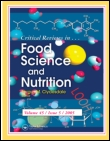
CRITICAL REVIEWS IN FOOD SCIENCE AND NUTRITION
Enhancing Understanding of Nutritional ScienceCRITICAL REVIEWS IN FOOD SCIENCE AND NUTRITION, published by Taylor & Francis Inc, is a premier peer-reviewed journal dedicated to advancing the understanding of food science and nutrition. With its ISSN 1040-8398 and E-ISSN 1549-7852, this influential journal has established itself as an essential resource in the field, featuring high-quality reviews and critical analyses that foster innovation and knowledge sharing among researchers, practitioners, and academics. Recognized as a Q1 journal in Food Science, Industrial and Manufacturing Engineering, and Medicine (miscellaneous) for 2023, it ranks impressively within the top percentiles of its respective fields, making it a valuable platform for impactful research. Although the journal does not currently offer open access, it continues to attract a readership eager to explore the intricacies of food science and its applications, thereby shaping future advancements in the industry. With an extensive history dating back to 1981 and convergence up to 2024, CRITICAL REVIEWS IN FOOD SCIENCE AND NUTRITION remains committed to providing comprehensive reviews that illuminate contemporary challenges and solutions in the domain of food science and nutrition.
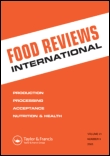
FOOD REVIEWS INTERNATIONAL
Transforming Research into Practical Solutions for the Food IndustryFOOD REVIEWS INTERNATIONAL, published by Taylor & Francis Inc, serves as a pivotal resource within the fields of Food Science and Chemical Engineering. Established in 1985, this esteemed journal offers a comprehensive platform for the dissemination of critical reviews that enhance understanding and innovation in the food industry. With an impressive impact factor reflecting its Q1 quartiles in both Food Science and Chemical Engineering categories, it ranks among the top journals in Scopus, securing the 24th spot in Agricultural and Biological Sciences. Scholars, researchers, and professionals are encouraged to explore its rich content, which spans meticulously reviewed articles that bridge academic research and practical applications, while contributing to advancements in food safety, processing, and sustainability. Although not an Open Access journal, access to its extensive repository is vital for anyone aiming to stay at the forefront of food science advancements.
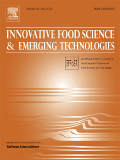
Innovative Food Science & Emerging Technologies
Exploring Innovations in Food and SustainabilityWelcome to Innovative Food Science & Emerging Technologies, a premier journal published by ELSEVIER SCI LTD that serves as a vital platform for researchers and professionals dedicated to the rapidly evolving field of food science. With an impressive Impact Factor and a position in the Q1 category across notable disciplines including Chemistry, Food Science, and Industrial and Manufacturing Engineering, this journal ranks among the top tier within its fields, evidenced by its Scopus ranking of 20th out of 389 in Food Science, placing it in the 94th percentile. Our readers can expect to encounter cutting-edge research and innovative applications from 2000 through 2024, exploring critical themes that contribute to advancements in food technology, manufacturing processes, and sustainability practices. Although currently not an Open Access publication, we maintain a commitment to disseminating high-quality scholarship that enhances knowledge and encourages collaboration among a diverse audience. Join us in driving forward the forefront of food science research in the Netherlands and beyond.
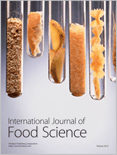
International Journal of Food Science
Championing Excellence in Food Science ScholarshipThe International Journal of Food Science, published by HINDAWI LTD, stands as a crucial platform for advancing knowledge within the realm of food science. Established in 2013, this Open Access journal based in Egypt has garnered significant recognition, achieving an impressive Q2 classification in the 2023 Food Science category, which reflects its commitment to quality and impactful research. With a Scopus rank of #88 out of 389 in Agricultural and Biological Sciences and placing in the 77th percentile, this journal serves as an essential resource for researchers, professionals, and students dedicated to innovative developments and scientific exploration in food science. The journal not only provides unrestricted access to valuable research but also aims to foster collaboration and dissemination of knowledge on critical issues affecting food safety, nutrition, and technology. For those looking to keep abreast of the latest advancements, the International Journal of Food Science is certainly an indispensable addition to their academic pursuits.

Food Frontiers
Pioneering Research in Food Safety and SustainabilityFood Frontiers, an esteemed publication in the Food Science domain, is proudly published by WILEY. Launched as an Open Access journal in 2020, it aims to facilitate the dissemination of high-quality research that influences contemporary food science and technology. The journal, with an E-ISSN of 2643-8429, has rapidly ascended to a Category Quartile ranking of Q1 in the Food Science category as of 2023, and boasts an impressive Scopus rank of #31 out of 389 in Agricultural and Biological Sciences, placing it in the 92nd percentile. The journal's mission is to explore innovative approaches to food production, safety, and sustainability, making it an essential resource for researchers, industry professionals, and students eager to stay at the forefront of food science advancements. With a commitment to open accessibility, Food Frontiers fosters collaboration and knowledge sharing across the globe, addressing the critical challenges and trends in feeding the world sustainably.

Foods is a premier open access journal published by MDPI, based in Switzerland, that has been at the forefront of disseminating high-quality research in the fields of food science, health professions, and plant science since its establishment in 2012. With an impressive convergence of interdisciplinary studies spanning various aspects of food, nutrition, and microbiology, the journal aims to provide a comprehensive platform for researchers and professionals to share innovative ideas and findings. Maintained as a Q1 journal in multiple categories for 2023, including Food Science and Health Professions, Foods has garnered significant recognition within the academic community, reflected in its strong Scopus rankings and percentiles across various disciplines. The journal not only promotes open access to enhance the visibility and accessibility of research but also encourages the exploration of sustainable food systems and health-related issues, thus contributing to essential discussions in today's society. For those looking to advance their understanding and expertise in food-related sciences, Foods serves as an enduring resource for groundbreaking studies and critical insights.
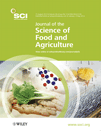
JOURNAL OF THE SCIENCE OF FOOD AND AGRICULTURE
Driving excellence in agronomy and nutrition.Welcome to the Journal of the Science of Food and Agriculture, a leading academic publication in the realms of Agronomy, Food Science, Biotechnology, and Nutrition. Founded in 1950 and published by Wiley, this journal has established itself as a vital resource for researchers and professionals committed to advancing knowledge and innovation in food and agricultural sciences. With a remarkable impact factor reflective of its esteemed status—ranking Q1 in Agronomy and Food Science and Q2 in Biotechnology and Nutrition, this journal stands at the forefront of critical research, featuring rigorous peer-reviewed articles that span a wide array of topics. Access options are available through institutional subscriptions, ensuring that indispensable research reaches both scholars and practitioners alike. As it converges into 2024, the journal continues to address key challenges and opportunities within the field, making it essential reading for anyone interested in sustainable agricultural practices and food security. Engage with cutting-edge research that shapes our understanding of food systems and agricultural advancements.